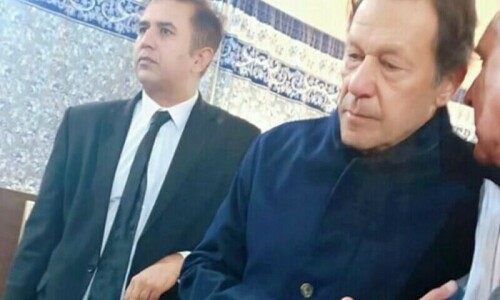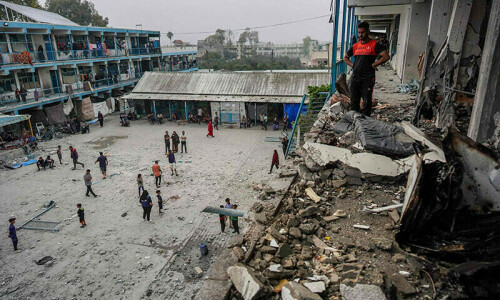WASHINGTON: Thomas Hamilton thought it was a joke.
As a young orbital analyst on the Apollo space programme, Hamilton was at the forefront of President John F. Kennedy’s bold challenge to put a man on the moon by the end of the 1960s.
Hamilton was returning to his desk at Grumman Aircraft after lunch at a Long Island farmer’s market on November 22, 1963, when “a draftsman noted for his sick humour said: ‘The president has been shot’.”
“I said, ‘Even for you that’s pretty sick’,” recalled Hamilton, today a retired astronomer, professor and writer who lives in Staten Island, New York.
“He insisted it was no joke.”
Being a scientist, Hamilton sought proof, so he called a local newsroom.
“Before I could even say anything, a woman who answered said, ‘It’s true, he’s dead,’ and hung up.”
Two out of three Americans today weren’t born when Kennedy was assassinated, but for many of them -- including baby boomers now in late middle age or retired -- “memorable” barely defines the impact of that moment.
“The news was like a punch in the stomach,” said writer and consultant Paul Robert Edwards, a law clerk who heard the news on the radio at a lunch counter in Kansas City, Missouri.
Angelo Armenti was 23 and studying for a graduate degree in physics in Philadelphia. He campaigned for Kennedy during the 1960 election, and even came within a few feet of shaking hands with him at a campaign event.
“I was backing my car out of a parking lot after lunch when a hysterically crying woman ran behind my car, screaming: ‘Kennedy’s been shot! Kennedy’s been shot!’” remembered Armenti, today a retired university president.
Like so many schoolchildren that day, Beatrice Hogg, an African-American coal miner’s daughter in a rural Pennsylvania town with a two-room schoolhouse, was sent home early.
There she found the adults in tears, vulnerable and confused and worried for the future.
“Momma and cousin Kat talked about what the death of president Kennedy would mean to the fate of the ‘coloured’ people in America,” said Hogg, today a writer and editor in California.
Beyond America’s borders, the sense of shock was no less powerful.
Alexander Longolius, a 28-year-old teacher in what was then a divided Berlin, was motoring to a soiree at a US diplomat’s home when he heard Kennedy had been shot.
“Nobody showed up at the reception in a happy mood. I don’t even think we got ourselves a drink. We just stood around and listened to the radio,” said Longolius, who today is retired from German politics.
The hope was that Kennedy -- who had made his famous “Ich bin ein Berliner” (I’m a Berliner) speech four months before -- would pull through. That was not to be.
“We were just devastated,” Longolius said. “Devastated and shocked, really... It seemed utterly incredible that the hopes and dreams of zillions of people were shattered that very moment.”
In Moscow, Alexandra Panina remembers no tears being shed at her school -- not because the United States was the Soviet Union’s arch enemy, but because students had been “taught to be strong, so we weren’t used to crying”.
But there was indignation and shock, said Panina, today a 68-year-old literature professor. “To kill a president in broad daylight, it was unimaginable for us.”
In Kennedy’s home state of Massachusetts, the nuns at Ramsey Bahrawy’s Catholic school assembled the pupils in the library to watch the news on TV from Dallas, then sent them to the chapel “to pray for JFK”, he said.
“I think I was more affected than my classmates because I was a recent immigrant from Egypt,” said Bahrawy, a lawyer in the state.
“My parents had drilled into me that we owed our ability to immigrate to the United States to president Kennedy and his administration.”
NOT EVERONE WAS SAD: In other parts of the country, however, contempt for Kennedy -- who won the 1960 election over Republican rival Richard Nixon by an extremely narrow margin -- ran so deep that the initial reaction was glee.
Lucy Siegel recalls playing basketball with other girls -- “wearing ugly green gym uniforms with big baggy bloomer-type pants” -- at school in Greenville, South Carolina, which in 1960 had voted strongly for Nixon.
“The gym teacher suddenly gathered us together and told us she had just heard the news that the president had been shot,” said Siegel, who today runs a New York public relations firm.
“A lot of the girls cheered and clapped -- this was pre-desegregation South Carolina, which was even more conservative than it is now. I was almost as shocked and upset by that behaviour as I was by the news about the shooting.”
Lana Mae Noone, in adult life a campaigner for the evacuation of Vietnamese war children, was an 18-year-old performing arts student in New York, riding a city bus in Manhattan, locked in a state of “total denial”. “Why are they saying he’s dead. That can’t be true’,” she recalled telling a fellow passenger.
“At the time, in my mind, death was something that only happened to the elderly -- and he (Kennedy) was so young and vibrant.”
“What I remember most was sitting in the school yard after we heard the news, watching planes flying overhead and wondering if the country was under attack,” said John Echeveste, a California PR consultant.
“It was a time when nuclear drills were mandatory and we all learned how to take cover under our desks... We couldn’t comprehend that someone so young, charismatic and vibrant as Kennedy had been cut down so quickly and violently “A hero died, and a degree of hope died with him.”—AFP












































Dear visitor, the comments section is undergoing an overhaul and will return soon.